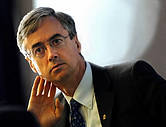Oct 2 2008
Sustainability is no longer just a matter of corporate social responsibility (CSR), it is a fundamental business proposition, James Leape, Director General of WWF International, told a business audience in Geneva this week.
 WWF Director General James Leape: “Sustainability must be a good business proposition. We are talking about a new bottom line.”
© WWF-Canon / Ezequiel Scagnetti
WWF Director General James Leape: “Sustainability must be a good business proposition. We are talking about a new bottom line.”
© WWF-Canon / Ezequiel Scagnetti
“WWF has been working for 47 years to save endangered species, but to save them we must get to grips with the challenge of humanity’s ecological footprint,” Mr Leape said at the opening session of WWF’s first One Planet Business conference.
Mr Leape said that the overuse of the world’s resources was having major impacts on the world’s wild places, and it must be tackled in the cities.
“With the urban population expected to double by 2050, new ways must be found in which to provide housing, food and transport,” Mr Leape said.
“If we are to achieve our goal of reducing the global ecological footprint to a sustainable level by 2050, we will need innovative partnerships among business, governments and civil society.
“We are promoting the concept of One Planet Living to help people understand and respond to this challenge, and our partnerships with business are at the heart of our strategy.
“Sustainability must be a good business proposition, but this is no longer just about corporate social responsibility. We are talking about a new bottom line.”
Mr Leape also went on to highlight the importance of water resources. “After climate change, water is the second biggest danger facing humanity,” he said.
“Water scarcity will be exacerbated by climate change. Seventy per cent of water use is linked to agriculture. A typical fast-food meal of hamburger, fries and cola requires 5,000 litres to produce it.”
The two-day conference featured case studies of WWF’s One Planet Living partnerships, including the Masdar City project in Abu Dhabi, a $22 billion solar-powered city that will be entirely car-free and produce zero waste.
It also highlighted examples where WWF has developed partnerships with industry sectors such as the Forest Stewardship Council and Marine Stewardship Council, initiatives which have helped bring sustainable wood and seafood products into mainstream markets.
One Planet Business is a WWF corporate engagement initiative aimed at transforming business practices and markets.
Other speakers at the two-day conference included Stefan Behling of the renowned architectural firm Foster and Partners, Dr Jonathan Woetzel from McKinsey and Malcolm Smith of Arup, the company developing the Dongtan eco-city in China.